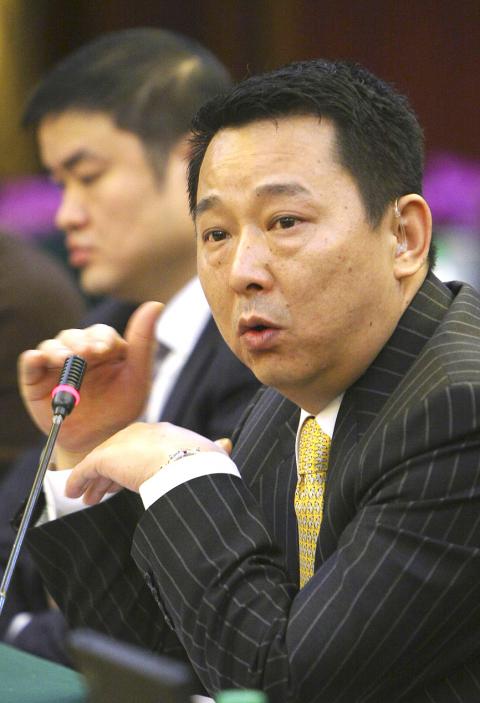Prosecutors in central China yesterday charged the former chairman of Hanlong Mining, which had tried to take over Australia’s Sundance Resources Ltd, with murder, gun-running and other crimes as part of a “mafia-style” gang.
Police last year announced the detention of Liu Han (劉漢), and an investigation into his younger brother Liu Yong (劉勇) — also known as Liu Wei (劉維) — on suspicion of various criminal activities.
In a report carried by Xinhua news agency, prosecutors in Hubei Province said the two Lius set up the gang in 1993, along with 34 others, which “carried out a vast number of criminal activities.”

Photo: Reuters
The gang was responsible for nine murders, the report said.
“Those charged also came up with myriad ways to draw in and corrupt officials who worked for the state, seeking their protection, to consolidate and expand their influence on society,” Xinhua added.
“Liu Han, Liu Wei and the others formed, led and participated in mafia-style crimes, murder, assault, illegal detention, interference in state functions, affray, extortion, gambling, illegally buying and selling guns, illegal gun ownership ... [and] fraud,” it said.
Reuters could not reach Hanlong for comment. It was also not possible to reach either of the brothers for comment.
The probe into Liu Han, ranked the 230th-richest person in China by the Shanghai-based Hurun Report in 2012, marks one of the highest-profile cases against private businessmen since Chinese President Xi Jinping (習近平) took power last year, vowing to crack down on corruption.
The police investigation into the activities of Liu Han and his associates eventually spanned more than 10 provinces and cities, including the capital, Beijing, Xinhua said.
Police seized thousands of bullets, plus 20 guns and three hand grenades, the report said, an unusual detail in a country where gun ownership is tightly controlled and gun crime rare.
State media reported last year that Liu Han was held for helping his brother Liu Yong evade capture over a 2009 triple murder.
Hanlong, based in southwestern Sichuan Province, holds a majority interest in the Australian-listed iron ore miner Moly Mines and remains Sundance Resources’ biggest shareholder, though its proposed A$1.4 billion (US$1.27 billion) takeover of Africa-focused Sundance was called off in April last year after Hanlong missed funding deadlines.
Uranium explorer Bannerman Resources ended talks on a A$143 million offer from Hanlong in late 2011 on similar funding hurdles.
Hanlong was also the principal financial backer and future customer of General Moly Inc’s US$1.3 billion molybdenum mining project in the US, in which Hanlong would help arrange a US$665 million loan from the China Development Bank. General Moly terminated the sale agreement in August.
Last month, Australia said it was seeking to prosecute a former executive of Hanlong Mining on insider trading charges after he was arrested in Hong Kong, while its former investment director, Calvin Zhu (朱博施), is serving a prison sentence in Australia for his role in an insider trading syndicate.

Nauru has started selling passports to fund climate action, but is so far struggling to attract new citizens to the low-lying, largely barren island in the Pacific Ocean. Nauru, one of the world’s smallest nations, has a novel plan to fund its fight against climate change by selling so-called “Golden Passports.” Selling for US$105,000 each, Nauru plans to drum up more than US$5 million in the first year of the “climate resilience citizenship” program. Almost six months after the scheme opened in February, Nauru has so far approved just six applications — covering two families and four individuals. Despite the slow start —

North Korean troops have started removing propaganda loudspeakers used to blare unsettling noises along the border, South Korea’s military said on Saturday, days after Seoul’s new administration dismantled ones on its side of the frontier. The two countries had already halted propaganda broadcasts along the demilitarized zone, Seoul’s military said in June after the election of South Korean President Lee Jae-myung, who is seeking to ease tensions with Pyongyang. The South Korean Ministry of National Defense on Monday last week said it had begun removing loudspeakers from its side of the border as “a practical measure aimed at helping ease

MOGAMI-CLASS FRIGATES: The deal is a ‘big step toward elevating national security cooperation with Australia, which is our special strategic partner,’ a Japanese official said Australia is to upgrade its navy with 11 Mogami-class frigates built by Japan’s Mitsubishi Heavy Industries, Australian Minister for Defence Richard Marles said yesterday. Billed as Japan’s biggest defense export deal since World War II, Australia is to pay US$6 billion over the next 10 years to acquire the fleet of stealth frigates. Australia is in the midst of a major military restructure, bolstering its navy with long-range firepower in an effort to deter China. It is striving to expand its fleet of major warships from 11 to 26 over the next decade. “This is clearly the biggest defense-industry agreement that has ever

DEADLY TASTE TEST: Erin Patterson tried to kill her estranged husband three times, police said in one of the major claims not heard during her initial trial Australia’s recently convicted mushroom murderer also tried to poison her husband with bolognese pasta and chicken korma curry, according to testimony aired yesterday after a suppression order lapsed. Home cook Erin Patterson was found guilty last month of murdering her husband’s parents and elderly aunt in 2023, lacing their beef Wellington lunch with lethal death cap mushrooms. A series of potentially damning allegations about Patterson’s behavior in the lead-up to the meal were withheld from the jury to give the mother-of-two a fair trial. Supreme Court Justice Christopher Beale yesterday rejected an application to keep these allegations secret. Patterson tried to kill her